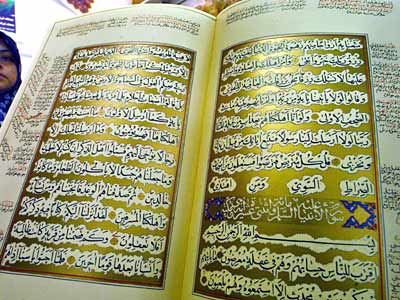Introduction to Islam (Part 2 of 5: Revelation)
 In yesterday’s blog post I began a brief introduction to Islam. I focussed primarily on the founding of Islam and Muhammad.
In yesterday’s blog post I began a brief introduction to Islam. I focussed primarily on the founding of Islam and Muhammad.
Today I would like to look at the divine revelation which Islam claims to have received, which is found principally in the Qur’an/Koran.
As I said yesterday, I have done my best to ensure factual accuracy in all these posts and have used Islamic sources as much as possible to ensure that I’m not propagating Christian misconceptions of Islam. I did send this to some Muslim friends for comment, but I have yet to hear back. If you are a follower of Islam and believe that I have misrepresented your religion, please drop me an email and I will remedy the situation.
The Qur’an
As mentioned in my previous post, the Qur’an (literally, “the recitation”) is a compilation of the messages given to Muhammad.
Christians and Muslims understand the concept of scripture differently. Christians describe the Bible, in the words of St. Paul, as being “God breathed” (theopneustos). As Dei Verbum explains:
“In composing the sacred books, God chose men and while employed by Him they made use of their powers and abilities, so that with Him acting in them and through them, they, as true authors, consigned to writing everything and only those things which He wanted” – Dei Verbum, Chapter 3
Muslims, on the other hand, view the Qur’an as the word of God in the most literal sense, believing that the text bears no imprint of the writer’s character whatsoever. Rather, they believe that the Qur’an is the literal word of God, dictated to Muhammad, written down verbatim.
The Qur’an is roughly the same length as the Christian New Testament, divided into 114 surahs (chapters), each chapter being composed of many ayat (verses). Each surah is arranged roughly in order of length. The chronologically early surahs deal primarily with spiritual topics and later ones generally consider the social issues within a Muslim community.
Whereas the Christian Bible contains many literary forms (history, wisdom, poetry, epistle etc.), there is no such diversity in the Qur’an, which basically has its own unique literary form, somewhere between prose and poetry. With the exception of surah 1, each surah is written as though it is God Himself who is speaking.
The entire Qur’an is written in Arabic and it is only considered to be perfect when it is left in this original language, as translations will inevitably be imperfect representations of the original.
Infinite respect is given to the Qur’an and it is treated as reverently as any Jew or Christian would treat his own scriptures, sometimes more so. No pious Muslim would ever consume food, smoke, or make noise while the Qur’an is being read aloud.
Quranic Construction
There was no complete set of collated and arranged documents at the time of Muhammad’s death. They were later compiled in the time of Abu Bakr, the first caliph (head of state), assembled from memory and from written records, some of which included text recorded on leaves and even camel shoulder-blades!
The oldest surviving fragments of Quranic manuscripts date from no earlier than the 8th Century, written in a Kufic script showing consonants only:
Thnk hw chllngng tht wld b t rd!
The third caliph, Uthman helped create an official standard by 656 AD and all other versions were ordered to be destroyed.
Interpretation
Where there is conflict between the different parts of the Qur’an, a simple rule is applied to determine which text to obey: the later verse abrogates the earlier one. The logic is that the earlier revelation dealt with an earlier stage of Muhammad’s mission but changing conditions demanded alteration. It is of great importance, therefore, to accurately determine which text is chronologically later.
When considering the teaching of the Qur’an, great respect is given to the Hadith (“narrative”). This is the record of Muhammad’s life and is somewhat similar to the concept of “Tradition” in Catholicism. Interestingly, Islam has its own version of Sola Scriptura believers, known as Quranists, who reject the Hadith.
Gospel of Barnabas
Another writing I’ve heard cited is the “Gospel of Barnabas”. Some Muslims suggest this to be the original gospel before the alleged corruption of the Christian scriptures. The gospel is effectively an Islamic version of a Christian New Testament gospel where Jesus’ divinity and crucifixion are denied, as they are in the Qur’an.
Shariah
There is an immense body of Islamic law known as Shariah (“the path leading to the watering place”), detailing every aspect of both an individual Muslim’s life and the running of an Islamic state. This is drawn primarily from the Qur’an and the Sunnah (the living habits of Muhammad).
Under Shariah, punishments for crime are severe: limb amputation for theft, stoning for adultery and death for conversion to another faith. Women have many restrictions placed on them. Jews and Christians are treated as second-class citizens and have to pay jizyah, a special tax.
No country today really rules according to full Shariah law. However, many do contain sizable elements of it within their legislation. For example the death penalty for conversion is still allowed in countries such as Saudi Arabia, Iran and Sudan.
Next Time
Tomorrow, in Part 3, I would like to look at the specific beliefs of Islam.

I wonder why Mohammad wrote this in Surah 9:30
Transliterated from Arabic
“qaatalahumu llahu anna yu’fakoona”
Correctly translated:
May God destroy them! How is it that they deceived themselves?”
This is because the Christians say God has a son. But if even Jesus said he is the son of God, then why curse the Christians.
Then another thing comes to mind.
Surah 5:116
And (remember) when Allah will say (on the Day of Resurrection):
“O ‘Iesa (Jesus), son of Maryam (Mary)! Did you say unto men: ‘Worship me and my mother as two gods besides Allah?’
Mohammad’s mistake was that he didn’t know the orthodox doctrines, as he listened to what anyone said, as there were heretics with false doctrines when he lived, who worshiped Jesus’ mother, which was an invention at AD 379 when a man called Ephraim Syrus started praying to Mary & the Saints, hence Mohammad’s misconception in Surah 5:116, as he thought that those (who actually were heretics) who worshiped Jesus’ mother represented all Christians.
When Mohammad drew the wrong conclusion, and when I read this erroneous conclusion, I have to say that this book, the Qur’an, cannot be from Allah/God, since it says something that isn’t true.
Is there some logical answer to excuse or correct Mohammads grave misconception about the Christians, since the worship of Jesus’ mother was an invention by a man at AD 379, and not practiced by all Christians, only the heretics who also persecuted the true Christians who wouldn’t submit to their teachings?
Hey Charvalie,
Thank you for your comment and welcome to Restless Pilgrim 🙂
I would agree with a lot of what you say. I would suggest that Mohammad’s misunderstanding of the Trinity is extremely damaging to the assertion that the Qur’an has God as its author.
However, I would dispute the assertion that Ephraim was a heretic, or that he worshiped Blessed Mary. Giving someone honour and asking for their intercession isn’t the same thing as worship. Worship of Mary, the Saints, or anything or anyone other than the Triune God is heresy and has always been rejected by the Church.
However, misinterpreting veneration and misunderstanding Saintly intercession is easily done, and I think that’s exactly what happened with both yourself and with Mohammad.
I would also dispute that this was an invention of AD 379. It’s a belief from the very beginning of Christianity. Outside of the New Testament we find extremely early support for the intercession of Angels and Saints:
Shepherd of Hermas (AD 80)
Clement of Alexandria (AD 208)
Origen (AD 233)
Cyprian of Carthage (AD 253)
Methodius (AD 305)
Cyril of Jerusalem (AD 350)
Hilary of Poitiers (AD 365)
There are also quite a few funeral inscriptions from the early 4th Century which testify to the belief in the intercession of the Saints:
“Pray for your parents, Matronata Matrona. She lived one year, fifty-two days”
Christians can ask for this intercession because we are all joined together by Christ and God is the God of the living, not of the dead.
God bless,
David.
Oh yes, and I forgot to mention Sub Tuum Praesidium, a prayer from about AD 250:
Beneath your compassion,
We take refuge, O Mother of God:
do not despise our petitions in time of trouble:
but rescue us from dangers,
only pure, only blessed one.